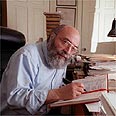
An adaptation by Aaron Posner from Chaim Potok's best-selling 1972 novel of the same name opened recently in a forceful production at the Westside Theatre in New York. Compressed into one 90-minute act, the memory play recalls the coming-of-age of a gifted, driven, Orthodox Jewish artist in 1950s Brooklyn.
Asher's devoutly Hasidic parents and community can't understand his need to draw at all, let alone his early compulsion to draw unpleasant subjects like demons, and later on, nudes and crucifixion scenes.
Youthful Asher has a self-absorbed world view, and Ari Brand convincingly embodies him at different ages with fierce intensity and passion. Narrating as an adult, Asher looks back over the years to his initial childhood obsession with drawing, stepping into intersecting scenes that reveal major events impacting his family and his artistic development.
Gordon Edelstein directs the production, cleverly staging it on a spare set with just three actors. Without being overly sentimental, Edelstein creates a slightly melancholy yet warm atmosphere, in quick scenes that reflect Asher's kaleidoscopic memories and display the complex issues he and his parents must deal with.
Posner's script is both gently humorous and rueful, as the boy who loves his family and his religion wrestles with a stronger need to pursue his art, wherever it may take him.
Brand coveys a range of nuance as Asher, alternately defensive, or mystified, or shocked by his own bold actions. His struggle to reconcile his art with his religion is paralleled by the ages-old generational battles of son versus father, displayed in a particularly humorous scene when Asher tries to explain to his shocked parents the difference between artistic nudes and "naked women."
Mark Nelson is excellent in several roles, first as Asher's good-hearted but stubborn father, Aryeh, who's often away from home opening yeshivas in postwar Russia and Europe. Nelson also creates a lively, wry persona for Jacob Kahn, a renowned Jewish artist who mentors teenage Asher with the blessing of the Rebbe who rules the Levs' Hasidic community. Nelson also enacts the Rebbe, with a weary but compassionate air.
Jenny Bacon appears lit from within as Asher's loving, gentle mother, Rivkeh, and greatly alters her personality to also portray a sophisticated gallery owner and a model. Rivkeh constantly tries to mediate between her son's belief in his gift and her husband's inability to accept that a "Torah Jew" could defy centuries of family tradition and follow the "foolishness" of art.
Prophetically, Kahn warns his young prodigy that, "Every great artist has freed himself from something – his family, his nation, his race... Something. A truly great artist must be tied only to his art." The story of Asher Lev provides a compellingly personal yet universal perspective on the demands of an artistic gift that cannot be denied.















